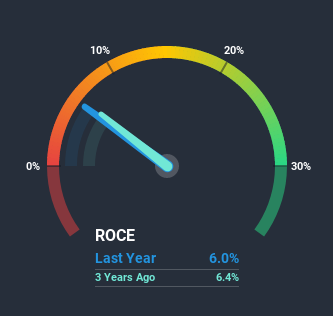- India
- /
- Renewable Energy
- /
- NSEI:NHPC
Should We Be Excited About The Trends Of Returns At NHPC (NSE:NHPC)?

Did you know there are some financial metrics that can provide clues of a potential multi-bagger? Firstly, we'd want to identify a growing return on capital employed (ROCE) and then alongside that, an ever-increasing base of capital employed. Put simply, these types of businesses are compounding machines, meaning they are continually reinvesting their earnings at ever-higher rates of return. However, after briefly looking over the numbers, we don't think NHPC (NSE:NHPC) has the makings of a multi-bagger going forward, but let's have a look at why that may be.
Understanding Return On Capital Employed (ROCE)
For those who don't know, ROCE is a measure of a company's yearly pre-tax profit (its return), relative to the capital employed in the business. The formula for this calculation on NHPC is:
Return on Capital Employed = Earnings Before Interest and Tax (EBIT) ÷ (Total Assets - Current Liabilities)
0.06 = ₹39b ÷ (₹713b - ₹63b) (Based on the trailing twelve months to March 2020).
Therefore, NHPC has an ROCE of 6.0%. On its own that's a low return on capital but it's in line with the industry's average returns of 6.0%.
View our latest analysis for NHPC

In the above chart we have measured NHPC's prior ROCE against its prior performance, but the future is arguably more important. If you're interested, you can view the analysts predictions in our free report on analyst forecasts for the company.
The Trend Of ROCE
Over the past five years, NHPC's ROCE and capital employed have both remained mostly flat. Businesses with these traits tend to be mature and steady operations because they're past the growth phase. So unless we see a substantial change at NHPC in terms of ROCE and additional investments being made, we wouldn't hold our breath on it being a multi-bagger. This probably explains why NHPC is paying out 44% of its income to shareholders in the form of dividends. Unless businesses have highly compelling growth opportunities, they'll typically return some money to shareholders.
The Key Takeaway
In summary, NHPC isn't compounding its earnings but is generating stable returns on the same amount of capital employed. Since the stock has gained an impressive 94% over the last five years, investors must think there's better things to come. However, unless these underlying trends turn more positive, we wouldn't get our hopes up too high.
On a final note, we found 2 warning signs for NHPC (1 shouldn't be ignored) you should be aware of.
For those who like to invest in solid companies, check out this free list of companies with solid balance sheets and high returns on equity.
When trading NHPC or any other investment, use the platform considered by many to be the Professional's Gateway to the Worlds Market, Interactive Brokers. You get the lowest-cost* trading on stocks, options, futures, forex, bonds and funds worldwide from a single integrated account. Promoted
Valuation is complex, but we're here to simplify it.
Discover if NHPC might be undervalued or overvalued with our detailed analysis, featuring fair value estimates, potential risks, dividends, insider trades, and its financial condition.
Access Free AnalysisThis article by Simply Wall St is general in nature. It does not constitute a recommendation to buy or sell any stock, and does not take account of your objectives, or your financial situation. We aim to bring you long-term focused analysis driven by fundamental data. Note that our analysis may not factor in the latest price-sensitive company announcements or qualitative material. Simply Wall St has no position in any stocks mentioned.
*Interactive Brokers Rated Lowest Cost Broker by StockBrokers.com Annual Online Review 2020
Have feedback on this article? Concerned about the content? Get in touch with us directly. Alternatively, email editorial-team@simplywallst.com.
About NSEI:NHPC
NHPC
Engages in the generation, sale, and trading of electricity through hydro, wind, and solar power stations in India.
High growth potential, good value and pays a dividend.
Similar Companies
Market Insights
Community Narratives



